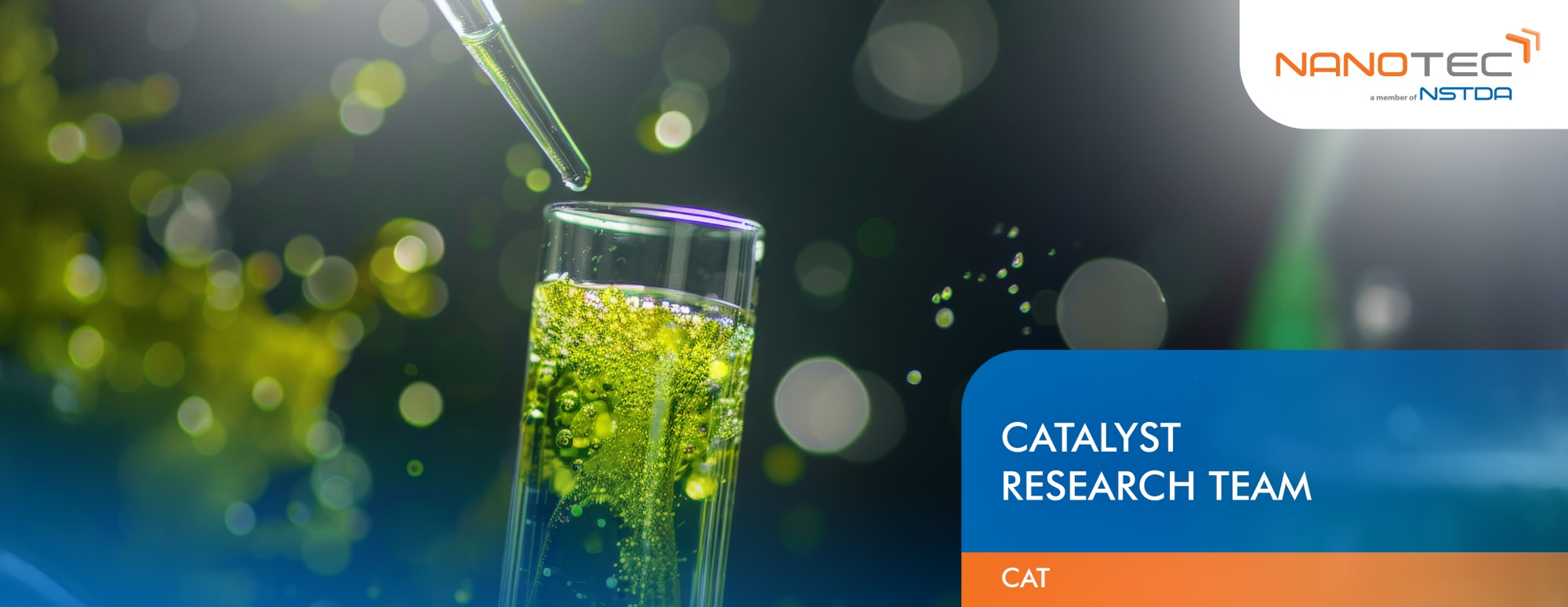
Catalyst Research Team
CAT research team focuses on the development of biobased industries (Biorefinery), Carbon Capture and Utilization (CCU) technology, and advanced material analytics for structural property analysis, aiming for sustainable development and contributing to a technological platform that drives Thailand toward a Net Zero emission target by 2065.
Our research team specializes in adding value to biomass such as fats and oils, including vegetable oils, fatty acids, waste from the vegetable oil industry, and lignocellulosic biomass like sugarcane leaves and rice straw. The CAT team has developed methods to transform industrial biomass into nanocarbon materials such as biocoal and high-quality activated carbon with functional groups for adsorption applications, targeting contaminants like BTEX, NOx, COx, H2S, and heavy metals. Additionally, we develop pre- and post-treatment processes to fractionate biomass into cellulose, hemicellulose, and lignin, which can be converted into nanocellulose fibers and lignin nanoparticles for various applications in industries such as petrochemicals, packaging, automotive, food, and healthcare. Furthermore, our research on catalytic processes includes converting biomass-derived derivatives into biobased chemicals from sugars, such as furfural, 2,5-furandicarboxylic acid (FDCA), and γ-valerolactone (GVL). We also target the development of products from plant oils and fats, including green diesel, biojet (sustainable aviation fuel, SAF), biolubricants, and short- and medium- chain fatty acids.
In the field of CCU, the CAT research team is dedicated to developing processes for greenhouse gas (GHG) mitigation by creating CO2 capture materials, including Metal Organic Frameworks (MOFs) and functionalized carbon materials. We also employ chemical engineering processes to remove CO2 through reactions like dry reforming and CO2 hydrogenation. Our innovations extend to chemical technologies such as artificial photosynthesis and electrochemical CO2 reduction. Additionally, our team has developed advanced material testing systems using in situ/operando XAFS, operando DRIFTS, and in situ TGA-MS techniques. These allow real-time analysis of chemical and physical phenomena, providing deep insight into material structures, reaction mechanisms, and catalyst functions under conditions similar to those in industrial settings.
Current Research Projects
- Development of CCU Technology for the industrial sector and driving National CCUS Alliance by integrating cooperation with partner networks.
- Development of Pilot scale Biomass-derived Biocoal production process
- Research and development of sustainable aviation fuel (SAF) with high potential feedstocks towards concretely reduce carbon dioxide emissions in the aviation industry in Thailand
- Synthesis, Shaping and CO2 Adsorption Properties of Metal-Organic Frameworks
- Process development for the complete cycle production of bio-based plasticizers from raw sugar
- Fabrication of nanosilver doped activated carbon into high-efficiency car air filter
- Conversion of post-combustion gas from cement manufacturing to syngas by electrochemical CO2 capture and reduction
- Development of Biolubricant Production Process using Fatty Acid Methyl Esters and Palm Oil Byproduct from Biodiesel Industry
- Scalable production of non-noble metal catalyst for the isomerization/cracking process of palm oil-derived hydrocarbons into sustainable aviation fuel (SAF)
- Research and Development of Nanolignin Structures from Hemp Stalks for UV Protection Applications in Sunscreen Products
Contact Us
Dr.Vorranutch Itthibenchapong, Dr.Nuttiporn
Email : vorranutch@nanotec.or.th, nuttiporn@nanotec.or.th Tel : 02-564-7100

